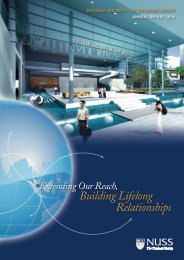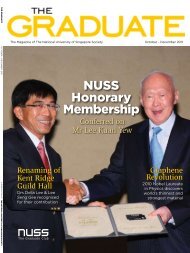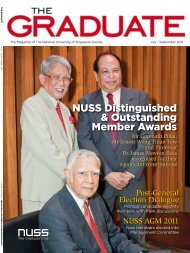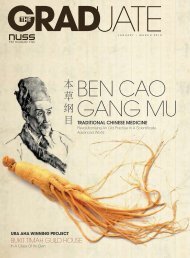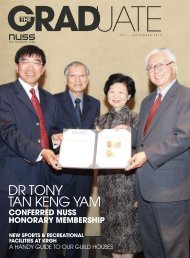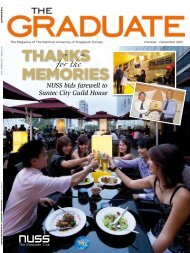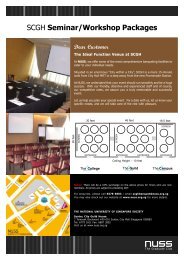The view from singapore with British High Commissioner to ... - NUSS
The view from singapore with British High Commissioner to ... - NUSS
The view from singapore with British High Commissioner to ... - NUSS
You also want an ePaper? Increase the reach of your titles
YUMPU automatically turns print PDFs into web optimized ePapers that Google loves.
Special report<br />
“Leaders should demonstrate<br />
emotional competence and<br />
lead <strong>with</strong> ‘Love’ which refers<br />
<strong>to</strong> a strong affiliation and<br />
coaching leadership style <strong>with</strong><br />
care and humility,<br />
instead of using<br />
‘Fear’ which refers<br />
<strong>to</strong> a coercive<br />
leadership style.”<br />
sales performance, wasted time<br />
and opportunities, as well as loss of<br />
cus<strong>to</strong>mers. <strong>The</strong> company’s reputation<br />
takes a hit and leaders who persist in<br />
their old ways may find themselves<br />
becoming a liability <strong>to</strong> the companies<br />
they serve.<br />
low eQ & no action<br />
Dr Karol Wasylyshyn, Adjunct Professor<br />
of Clinical Psychology at Institute<br />
for Graduate Clinical Psychology at<br />
Widener University and author of Behind<br />
the Executive Door: Unexpected<br />
Lessons in Managing your Boss and<br />
Career, shared a s<strong>to</strong>ry of how one of<br />
her clients refused <strong>to</strong> accept the 360degree<br />
report that she had compiled<br />
based on feedback <strong>from</strong> his company.<br />
“He was very self-focused and<br />
very narcissistic. <strong>The</strong> only thing<br />
he really cared about was his<br />
relationships <strong>with</strong> the people at the<br />
<strong>to</strong>p and looking good,” described<br />
Dr Wasylyshyn.<br />
After her client confronted his<br />
leadership team about the report in<br />
a meeting, he was later <strong>to</strong>ld behind<br />
closed doors that if he did not make<br />
12 THE GRADUATE Jan-Mar 2013<br />
professor Sattar Bawany<br />
Master Executive Coach<br />
Executive Development associates<br />
an effort <strong>to</strong> change his behaviour, his<br />
retirement would be accelerated as he<br />
was close <strong>to</strong> retiring then.<br />
“And he would not hear of it, his<br />
defences were so strong and that was<br />
what happened,” she commented.<br />
“<strong>The</strong>y accelerated his retirement and<br />
they put someone else in the job.”<br />
“It starts <strong>with</strong> the intention.<br />
Leaders have <strong>to</strong> decide that they<br />
need <strong>to</strong> evolve in that way,”<br />
Dr Wasylyshyn concluded.<br />
Mr Tan shares the same <strong>view</strong>,<br />
“<strong>The</strong> will <strong>to</strong> have EQ has <strong>to</strong> do <strong>with</strong><br />
whether we care enough about our<br />
staff or colleagues. If a leader does not<br />
care about people or their well-being,<br />
they typically lack the ingredient <strong>to</strong><br />
have high EQ.”<br />
Having low EQ does not mean<br />
things cannot get better. As long as<br />
there is the intention and motivation<br />
<strong>to</strong> improve, a company can still be<br />
taken <strong>to</strong> new heights even when<br />
things seem bleak. Chade-Meng<br />
Tan, best-selling author of Search<br />
Inside Yourself, shared the s<strong>to</strong>ry 3 of<br />
Patagonia, a company that makes<br />
outdoor clothing and gear. Casey<br />
1. Cavallo, K. & Brienza, D. (2001). Emotional competence and leadership excellence at Johnson & Johnson: <strong>The</strong> emotional intelligence and leadership study.<br />
2. Gosling. M (2006). <strong>The</strong> Emotional Intelligence of Managers in Singapore<br />
3. http://knowledge.whar<strong>to</strong>n.upenn.edu/article.cfm?articleid=2992<br />
Sheahan, the CEO, had wanted <strong>to</strong><br />
lay off people during an economic<br />
downturn as he thought that was the<br />
only solution available <strong>to</strong> him. His<br />
wife, Tara, then asked him, “Are you<br />
making this decision out of fear or<br />
out of love?”<br />
When Casey realised that he was<br />
acting due <strong>to</strong> fear, he decided not<br />
<strong>to</strong> lay off people and this decision<br />
eventually paid off when the company<br />
achieved record sales the year after.<br />
Imagine what it would have been<br />
like had Casey gone through <strong>with</strong> the<br />
layoffs. He would have <strong>to</strong> spend extra<br />
time and money <strong>to</strong> hire new people<br />
and train them properly.<br />
“Even when it is ‘obvious’ that<br />
you have <strong>to</strong> fire people, if you see<br />
things in an emotionally intelligent<br />
way, it turns out that it may not be<br />
the only solution. <strong>The</strong>re may be other<br />
creative solutions that enable better<br />
outcomes,” said Chade-Meng.<br />
What ei is not<br />
While being considerate of other<br />
people’s feelings is a key trait of<br />
being emotionally intelligent,<br />
Dr Granville stressed that EI is not<br />
about being ‘nice’. “Leaders should<br />
demonstrate emotional competence<br />
and lead <strong>with</strong> ‘Love’ which refers<br />
<strong>to</strong> a strong affiliation and coaching<br />
leadership style <strong>with</strong> care and<br />
humility, instead of using ‘Fear’<br />
which refers <strong>to</strong> a coercive leadership<br />
style,” said Professor Sattar Bawany,<br />
Master Executive Coach of Executive<br />
Development Associates. “Flexible<br />
leadership, however, involves being<br />
able <strong>to</strong> adapt your leadership style<br />
according <strong>to</strong> the situation and the<br />
state of the team.”<br />
It is clear that EI is the critical<br />
currency that sets a leader apart <strong>from</strong><br />
his peers and propels an organisation<br />
<strong>to</strong> success. Of course, there<br />
are exceptions where leaders who<br />
lack EQ are <strong>to</strong>lerated because they<br />
bring in the results. But the minute a<br />
major crisis hits the company, when<br />
people’s emotions are at their most<br />
turbulent, it is the wise leader who<br />
will seek <strong>to</strong> improve their EQ <strong>to</strong> keep<br />
up <strong>with</strong> their company’s changing<br />
needs <strong>with</strong> a softer <strong>to</strong>uch and more<br />
creative solutions.



